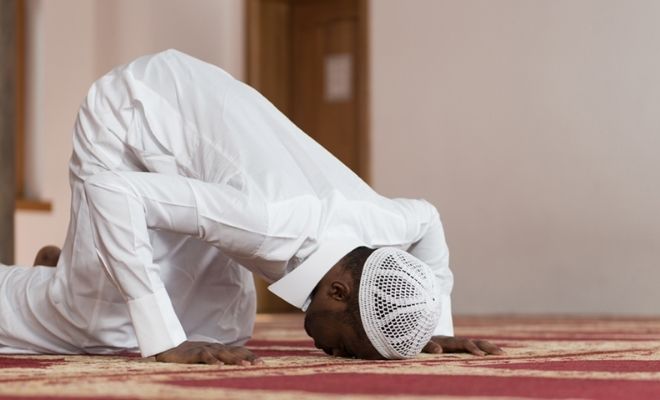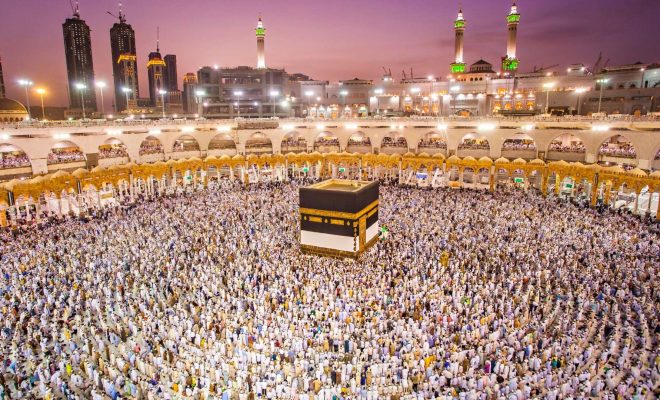Strive to Please Allah (swt) Rather Than to Please the People

Wordly status that is based on wealth, or lineage, or access to power and privilege cripples the one who is afflicted by it – it is a dangerous corruption that is an obstacle to those who seek to commit themselves to Islam and to honor its commands; it prevents the one who perceives himself to be of a higher status than others from listening to the good advice of others; and it prevents the one who perceives himself of a lesser status from accounting others for their wrongs.
Pomp, privilege, and VIP protocol are extended to those who are conceived into higher status, and people observe this during the initial formation of a new relationship – they are sized up regarding their family connections, education, and wealth, and their “place” and status in society is decided based on that.
With some, even acts of piety become a means to earn status. Status upon worldly standards is deserving of rejection, like the Hindu caste system or English class system, which are despicable; not only do they reek of injustice and discrimination, it is also far removed from the pure standards that Islam has set.
Allah (swt) and His Messenger (saw) provided the cure for this debilitating disease of desiring worldly status. Islam awakens within human beings true humility when contrasted with the greatness of Allah (swt), and brings us to give thanks for any privilege He (swt) has extended to us. Islam drives a believer to sacrifice all that he has of privilege in order to further the cause of truth, rather than allowing it to become a wall that prevents him from seeing the truth. Islam teaches the believer that sacrificing the Dunya for the sake of Allah (swt) is a most worthwhile undertaking, rather than looking down on it as destructive or wasteful. Islam sets the believer’s eyes firmly on seeking the highest status in the Akhirah, by seeking the pleasure of Allah (swt) and firmly rooting Taqwa in one’s heart and mind.
Allah (swt) said,
“O mankind, truly We have created you from male and female and made you into nations and tribes that you may know one another. Truly, the most honorable of you with Allah are those with the most Taqwa. Truly, Allah is Knowing and Acquainted.” [49:13]
Let us remember that this noble Ayah was revealed to a society which was stricken by love for status in the Dunya. Tribal origins were the basis for forming relations, determining justice, and establishing one’s standing in society. Tribal lineage was held as an even higher standard for worldly status than wealth in our age, which is already drowned in the cheap materialism of Western civilization.
Thus, Allah (swt) reminded us that we were all created from a single person, Adam (as), and from that person Allah (swt) created his mate, Hawwa’; from their offspring Allah (swt) made nations comprised of tribes, which include sub-tribes. Therefore, Allah (swt) reminded those afflicted with the illness of tribalism of their equal status in origin – for all people are the descendants of Adam and Hawwa’ and share this honor equally.
Allah (swt) confirmed to mankind that they are all equal in their humanity in origin, and then elevated some over others on the basis of Taqwa alone. Lineage is not to be used for pride or status, but for identification only. Mujahid said that Allah (swt)’s statement “that you may know one another” refers to one’s saying “So-and-so, the son of so-and-so, from the tribe of so-and-so.”
In our great Deen, the standard for high rank is that which is concealed within the hearts of men, yet it is in plain sight for Allah (swt). RasulAllah (saw) gave a Khutbah to the people on the day of the opening of Makkah in which he (saw) said:
“O people! Truly Allah has removed the slogans of Jahiliyyah from you and its reverence of forefathers. Now there are only two types of people: Either a man who is righteous, has Taqwa, and is honorable with Allah, or a man who is a flagrant sinner, miserable, and lowly to Allah. People are children of Adam and Allah created Adam from dust.” [Tirmidhi]
Al-Bukhari narrated that Abu Hurayrah (ra) said, “People asked the Prophet (saw) ‘Who is the most honorable among people?’ He replied, ‘The most honorable of you with Allah are those with the most Taqwa.’ They said, ‘We are not asking about this.’ He (saw) said, “Then the most honorable person is Yusuf, Allah’s Prophet, the son of Allah’s Prophet, the son of Allah’s Khalil (friend, Ibrahim).’ They said, ‘We are not asking about this.’ He (saw) said, ‘Then you want to ask me about the Arab lineage.’ They said, ‘Yes.’ He said, ‘Those of you who were best in Jahiliyyah are the best of you in Islam – if they attain understanding of the Deen’.”
RasulAllah (saw) warned this Ummah about taking appearance or wealth as the standard for high rank. Wealth grants worldly status today such that the people flock around the wealthy like bees to honey, praising and serving them, only to promptly abandon anybody who falls on hard times as if they never knew them. RasulAllah (saw) said,
“Truly, Allah does not look at your appearance or wealth, but he looks at your hearts and actions.” [Muslim]
Thus, RasulAllah (saw) reminded the Muslims to focus on that which really elevates them: their hearts filled with Iman and Taqwa, and their actions controlled and limited within the commands and prohibitions of Allah (swt).
In the Islamic society, Taqwa is the standard for high rank, so the envy of those with an abundance of wealth is rejected. Such envy is replaced with Ghibt (positive envy) for the one who gives from his abundant wealth to the cause of Islam, and Ghibt for the one who has knowledge of the Deen in abundance and conveys it to others. RasulAllah (saw) said,
“There should be no envy but only in case of two persons: One who was blessed with wealth, and the ability to spend it in the cause of the truth, and (the other) who was blessed with wisdom in the Deen, which he uses to judge with and teaches it to others.” [Muslim]
In the Islamic State, Taqwa is the standard for high rank in leadership positions, and so there is no favoritism for the wealthy – as is commonly seen around the world today. When it was requested that a woman who committed theft be pardoned because she was from a noble family, RasulAllah (saw) warned the Muslims saying,
“The people before you were ruined because when a noble person among them committed theft, they would leave him, and if a weak person among them committed theft, they would execute the legal punishment on him. By Allah, if Fatimah – the daughter of Muhammad – were to commit theft, I would cut off her hand.” [Bukhari]
And woe to those who ruin themselves by using acts of piety as a means to earn worldly status in the sight of the people. Indeed, Riyaa’ (showing off) is not piety, for piety is seeking the pleasure of Allah (swt). Riyaa’ is showing off in order to please the people, and achieves nothing but the anger of Allah (swt). RasuAllah (saw) said,
“At the end of the time, there will be the worms of (Qur’an) reciters. So, whomever lived at that time, let him seek refuge in Allah from the cursed Shaytan and from those (reciters), for they are the most rotten. Then there will appear hooded garments, and at that time they will have no shame from committing Riyaa’. The one who holds to his Deen during that period will be like the one who holds his hand on a live coal, and the one who holds to his Deen will have the reward of fifty men. The Sahaba asked: Will they be like fifty of them or us? He said: Fifty of you.” [Al-Haakim]
The one who yearns for a high rank with Allah (swt) cares not for how people perceive his good deeds. The one who is truly driven by Taqwa will enjoin the good and forbid the evil, regardless of whether the people are pleased with him doing so or not. He who will speak the truth firmly and act decisively to account the people and the rulers regardless of the blame of the blamers.
Islam liberates man from the cheap struggle for worldly status in this temporary life, and raises the ambition of the believer to pursue a high rank in the Akhirah and the eternal Jannah. Therefore, the one who is wise will seek to raise his rank to that of the most favored of the inhabitants of Jannah: the Siddiqeen (those who accept the truth instantly and unconditionally) and the Shuhadaa (martyrs). RasulAllah (saw) said,
“The one who asks Allah for Shahada (martyrdom), Allah will raise him to the high rank of the Shuhadaa, even if he dies in his bed.” [Muslim]
Thus, the believer discards worldly ambitions, and fixes his gaze firmly on the Akhirah, establishing his relations based on Islam, without consideration of lineage or wealth. RasulAllah (saw) said,
“There are people from the servants of Allah who are neither Prophets nor Shuhadaa – the Prophets and Shuhadaa will envy them on the Day of Resurrection for their status with Allah (swt). The Sahaba asked: Tell us, O Messenger of Allah, who are they? He replied: They are people who love one another for the spirit of Allah (meaning, the Qur’an) without having any mutual kinship or exchange of property. I swear by Allah, their faces will glow and they will be sitting on thrones of light. They will have no fear (on that Day) when the people will be afraid, and they will not grieve (on that Day) when the people will grieve.” Then he (saw) recited the verse: “Truly, the Awliyaa’ (allies/friends) of Allah will not fear, nor shall they grieve.” [Abu Dawud]
Therefore, even though such believers are not better than the Prophets or the Shuhadaa, they will have such honor that even the Prophets and the Shuhadaa will acknowledge their high rank. So, let each believer play his part in laying the firm foundation for a new era of the rise of Islam, forming the generation that strives for the highest ranks in the sight of Allah (swt) alone.









